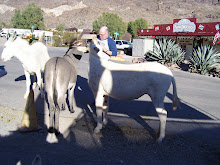I went to two movies in the last nine days. In itself, this is a feat because, by my count, I had been to one in the last four months.
As surprising as that stat may be, here is an even better one: both movies were very good and were aimed (at least in part) at people in my age bracket.
Last Chance Harvey is a romantic comedy set in London. Dustin Hoffman seems like an odd choice to play the lead. He's now 71 years old but, in this movie, he can pass for 50-55 easily.
He's a struggling, divorced jingles writer who attends his daughter's wedding. Once he gets there, he finds out his daughter wants her stepdad (played by James Brolin) to give her away. Although Kathy Baker (his ex-wife) and Brolin don't have a lot of scenes, they chew up the scenery wonderfully.
In the midst of this, Emma Thompson enters the fray. She plays a single woman roughly her exact age (49) who has a very boring job who wants to love and be loved and spends a lot of time with her mother, a character in her own right.
Without giving away the plot, these old pros speak like people in their age bracket are supposed to - softly. Hoffman and Thompson are a delight to watch because they are exact opposites in style. Hoffman uses silence and pauses between words. When Thompson speaks, she does so quickly (as the Brits are wont to do). But she also can give a look of resignation and contentment that speaks louder than anything that could have been said.
Dating (or merely) mixing at this age is a tricky business. One suspects a 20-something viewer will be bored early. And the final lines ring like something that is probably said by anybody in that age bracket who just met someone they really are fond of.
Frost/Nixon is a virtual opposite of a movie from Last Chance Harvey except for one thing: it, too, is heavy on dialogue. You damn near have to be an AARPer to remember Richard Nixon. As a teen, I was always baffled as to how he got as far as he did in politics. The movie is about the David Frost interviews with Nixon in 1977. At the time, they were unsettling to many because they set a standard for checkbook journalism. Nixon had been out of office for three years and almost out of mind.
The drama necessarily delves into the background and back dealings to make the interviews possible. But it is Frank Langella's performance as Nixon that is compelling. Folks who think they know more than me (i.e. critics) seem unanimous in saying it is a better play than it is a movie. That may be so but those of us who were around in the Nixon era remember how hard it was to get the man to admit he did anything wrong (just like a lot of us AARPers do now) and it wasn't hard to recall those feelings again.
Watching Langella finally give in and say what he really felt was terrific stuff. As I get older, I find it harder to keep my tongue at times. Hindsight is, at times, a terrible burden. In this movie, however, you see the younger, cockier Frost (played by Michael Sheen) get held at bay for a long time by the cool old pro. As we get older, however, our nerves and resolve aren't what they used to be. Finally, Langella gives Frost what he (and his backers) were looking for. It is one thing to admit mistakes when you are young - you have time to correct them. When you are older, you may not get another chance. You can hear the pain in the voice of the man who once was the powerful man in the country admit he lied to us ... because he could.
This is hard, intelligent stuff and it isn't the type of moviewatching that usually brings in big bucks. Still, it is nice to see some directors remembered to include us older folks in on something we are either interested in or can relate to.
After all, not everybody can afford (or even wants to) eat steak at a restaurant. Some folks just like a nice ol' hamburger.
Monday, January 26, 2009
Subscribe to:
Post Comments (Atom)


No comments:
Post a Comment